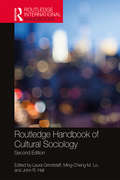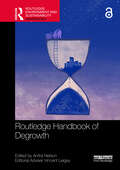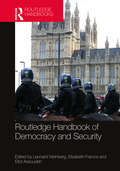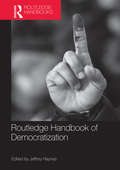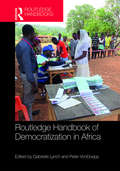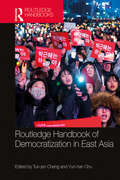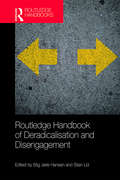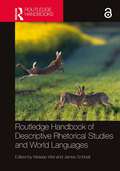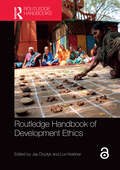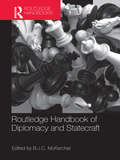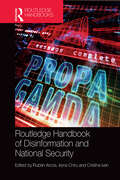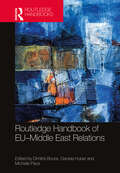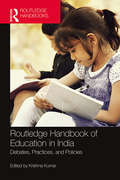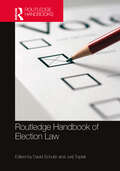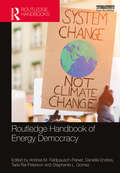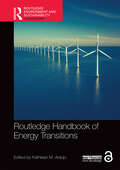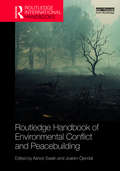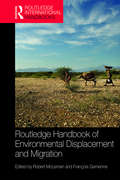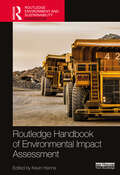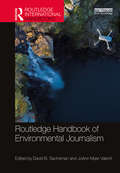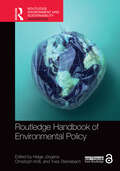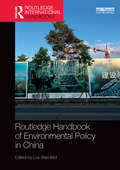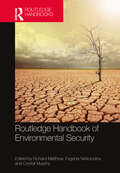- Table View
- List View
Routledge Handbook of Cultural Sociology: 2nd Edition (Routledge International Handbooks)
by John R. Hall Laura Grindstaff Ming-Cheng M. LoThe thoroughly revised and updated second edition of the Routledge Handbook of Cultural Sociology provides an unparalleled overview of sociological and related scholarship on the complex relations of culture to social structures and everyday life. With 70 essays written by scholars from around the world, the book brings diverse approaches into dialogue, charting new pathways for understanding culture in our global era. Short, accessible chapters by contributing authors address classic questions, emergent issues, and new scholarship on topics ranging from cultural and social theory to politics and the state, social stratification, identity, community, aesthetics, and social and cultural movements. In addition, contributors explore developments central to the constitution and reproduction of culture, such as power, technology, and the organization of work. This handbook is essential reading for undergraduate and postgraduate students interested in a wide range of subfields within sociology, as well as cultural studies, media and communication, and postcolonial theory.
Routledge Handbook of Defence Studies
by David J. Galbreath John R. DeniThe Routledge Handbook of Defence Studies provides a comprehensive collection of essays on contemporary defence studies by leading international scholars. Defence studies is a multi-disciplinary study of how agents, predominantly states, prepare for and go to war. Whereas security studies has been broadened and stretched to cover at times the near totality of international and domestic affairs, and war studies has come to mean not just operations and tactics but also experiences and outcomes, defence studies remains a coherent area of study primarily aimed at how defence policy changes over time and in relation to stimulating factors such as alterations in power, strategy and technology. This new Handbook offers a complete landscape of this area of study and contributes to a review of defence studies in terms of policy, security and war, but also looks forward to new challenges to existing conceptions of defence and how this is changing as states and their militaries also change. The volume is divided into four thematic sections: Defence as Policy; Defence Practice; Operations and Tactics; and Contemporary Defence Issues. The ability to review the field while also looking forward to further research is an important element of a sustainable text on defence studies. In as much as this volume is able to highlight the main themes of defence studies, it also offers an in-depth look into how defence issues can be examined and compared in a contemporary setting. This Handbook will be of great interest to students of defence studies, strategic studies, war studies, security studies and IR.
Routledge Handbook of Degrowth (Routledge Environment and Sustainability Handbooks)
by Anitra Nelson Vincent LiegeyThis handbook takes stock of ‘degrowth’, a concept and movement gaining increasing visibility in the 2020s. Contributors explain contexts for degrowth’s significance, elaborate its diverse history and detail its unique approaches, practices, challenges and potential futures. Part I sets the ecological, economic and political contexts framing degrowth’s evolution as a significant concept for societies facing the challenges of deepening socio-political inequities and ecological unsustainabilities. Part II identifies themes characterising degrowth movements in a sample of distinctive countries, starting with its origins in France. Part III shows degrowth ‘concepts in action’, explaining in practical ways the meanings of terms such as ‘conviviality’, ‘degrowth doughnut’, ‘frugal abundance’, ‘commoning’ and ‘defashioning’. Part IV offers analyses and forward-looking imaginaries for degrowth from the perspectives of distinctive agents, agendas and theoretical frameworks. Contributors engage with topics such as ecofeminist futures, utopian thought and show how degrowth is necessary to address poverty.Highly experienced and knowledgeable contributors from varied scholarly and practitioner fields address a range of strategic, activist, policy and research questions in this handbook. Grounded in empirical cases, they identify significant social and ecological challenges, relevant to students, researchers, activists, policymakers and practitioners at various levels within the wide range of fields in which degrowth can be applied.
Routledge Handbook of Democracy and Security
by Leonard Weinberg, Elizabeth Francis and Eliot AssoudehThis handbook explores how democracies around the world seek to balance democratic values with the requirement to protect their citizens from the threat of politically motivated violence. Over the past few decades, the majority of the world’s democracies have had to confront serious security threats, and in many instances these challenges have not come from rival states but from violent groups. This volume offers readers an overview of how some democracies have responded to such threats. It examines the extent to which authorities have felt compelled to modify laws to evade what would ordinarily be regarded as protected rights, such as personal privacy, freedom of movement and freedom of speech. Grounded in historical analysis, each of the sections addresses past and emerging security threats; legal and legislative responses to them; successful and unsuccessful efforts to reconcile democracy and security; and a range of theoretical questions. The case studies provided vary in terms of the durability of their democratic systems, level of economic development and the severity of the threats with which they have been confronted. The volume is divided into three thematic parts: Strong democracies: United States, Great Britain, France, Germany, Italy, Spain, Australia, New Zealand and Israel Challenged democracies: India, South Africa, Brazil, Argentina and Romania Fragile democracies: the Philippines and Nigeria. This book will be of much interest to students of democracy, security studies, political philosophy, Asian politics, Middle Eastern politics, African politics, West European politics and IR in general.
Routledge Handbook of Democratization
by Jeffrey HaynesThis exciting new handbook provides a global overview of the process of democratization, offering chapter by chapter discussion at both the country and regional levels and examining the interaction between the domestic and external factors that affect the progression of countries from authoritarian to democratic rule. Bringing together 29 key experts in the field, the work is designed to contrast the processes and outcomes of democratic reform in a wide range of different societies, evaluating the influence of factors such as religion, economic development, and financial resources. It is structured thematically into four broad sections: Section I provides a regional tour d’horizon of the current state of democratisation and democracy in eight regions around the world Section II examines key structures, processes and outcomes of democratisation and democracy Section III focuses on the relationship between democratisation and international relations through examination of a range of issues and actors including: the third and fourth waves of democracy, political conditionality, the United Nations, the European Union, the African Union and the Organisation of African States Section IV Examines the interaction between democratisation and development with a focus on poverty and inequality, security, human rights, gender, war, and conflict resolution. A comprehensive survey of democratization across the world, this work will be essential reading for scholars and policy-makers alike.
Routledge Handbook of Democratization in Africa
by Gabrielle Lynch Peter VondoeppThis volume explores the issues and debates surrounding the ongoing processes of democratization in sub-Saharan Africa, illuminating the central dynamics characterizing Africa’s democratic experiments, and considering the connections between democratization and economic, social, and cultural developments on the continent. Reflecting the diverse and rich nature of this field of study, the Handbook of Democratization in Africa features more than thirty contributions structured into six thematic sections: The politics and paths of regime development Institutional dynamics Political mobilization and voting dynamics The politics of identity Social forces from below The consequences of democracy. Chapters offer overviews of the key scholarship on particular topics, including central insights from the latest research, and provide suggestions for those interested in further inquiry. The material includes attention to broad cross-continental patterns, for example with respect to public opinion, political violence, or the role of different institutions and actors. It also includes rich case material, drawing on and highlighting the experiences of a diverse collection of countries. Encouraging a comprehensive view of key concerns and enhancing understanding of particular issues, the Handbook of Democratization in Africa represents a critical resource for experts and students of African politics, democratization, and African studies.
Routledge Handbook of Democratization in East Asia
by Yun-Han Chu Tun-Jen ChengThis handbook provides a comprehensive analysis of the dynamics and prospects of democratization in East Asia. A team of leading experts in the field offers discussion at both the country and regional level, including analysis of democratic attitudes and movements in China, Japan, South Korea, and Taiwan. Evaluating all the key components of regime evolution, from citizen politics to democratic institutions, the sections covered include: • Regional Trends and Country Overviews • Institutions, Elections, and Political Parties • Democratic Citizenship • Democratic Governance • The Political Economy of Democratization Examining the challenges that East Asian emerging democracies still face today, as well as the prospects of the region's authoritarian regimes, the Routledge Handbook of Democratization in East Asia will be useful for students and scholars of East Asian Politics, Comparative Politics, and Asian Studies.
Routledge Handbook of Deradicalisation and Disengagement
by Stig Jarle Hansen Stian LidThe Routledge Handbook of Deradicalisation and Disengagement offers an overview of the historical settings, theoretical debates, national approaches and practical strategies to deradicalisation and disengagement. Radicalisation and violent extremism are major global challenges, and as new and violent extremist groups and environments emerge, there is an increasing need for knowledge about how individuals physically exit these movements and how to change their mindset. Historically, much of the focus on these topics has been highly securitised and militarised; by contrast, this volume explores the need for more community-based and ‘soft’ approaches. The handbook includes discussions from both right-wing/left-wing political and religiously inspired deradicalisation processes. The handbook is organised into three parts: 1 definitions, backgrounds and theories; 2 actors; 3 regional case studies. This handbook will be of much interest to students, researchers, scholars and professionals of deradicalisation, counterterrorism, political violence, political extremism, security studies and international relations in general.
Routledge Handbook of Descriptive Rhetorical Studies and World Languages
by Weixiao Wei James SchnellThe Routledge Handbook of Descriptive Rhetorical Studies and World Languages offers a useful collection of papers that presents rhetorical analysis of the discoursal practice in different cultural settings. Covering issues from America to Europe and Asia, and topics from politics to media, education to science, agriculture to literature, and so on, the handbook describes how language can guide listeners’ interpretations, alter their perceptions and shape their worldviews. This book offers a solid foundation for rhetorical studies to become an essential discipline in arts and humanities, engendering innovative theory and applications in areas such as linguistics, literature, history, cultural studies, political science and sociology. This handbook will be crucial for students and researchers in areas such as literature and linguistics, communication studies, political science and arts and humanities in general. This book will also be useful to social science, education, business, law, science and engineering departments due to its coverage of rhetoric in a multidisciplinary and multilingual context.
Routledge Handbook of Development Ethics
by Lori Keleher Jay DrydykThe Routledge Handbook of Development Ethics provides readers with insight into the central questions of development ethics, the main approaches to answering them, and areas for future research. Over the past seventy years, it has been argued and increasingly accepted that worthwhile development cannot be reduced to economic growth. Rather, a number of other goals must be realised: • Enhancement of people's well-being • Equitable sharing in benefits of development • Empowerment to participate freely in development • Environmental sustainability • Promotion of human rights • Promotion of cultural freedom, consistent with human rights • Responsible conduct, including integrity over corruption Agreement that these are essential goals has also been accompanied by disagreements about how to conceptualize or apply them in different cases or contexts. Using these seven goals as an organizing principle, this handbook presents different approaches to achieving each one, drawing on academic literature, policy documents and practitioner experience. This international and multi-disciplinary handbook will be of great interest to development policy makers and program workers, students and scholars in development studies, public policy, international studies, applied ethics and other related disciplines.
Routledge Handbook of Diplomacy and Statecraft
by B.J.C. McKercherDespite post-Cold War arguments about their demise, ‘Great Powers’ not only continue to thrive, with lesser Powers they form the basis of the constellation of global politics. This topical new Handbook illustrates how and why the new international order has evolved – and is still evolving – since the end of the Cold War, through the application of diplomacy and statecraft. Including cutting edge contributions from over 40 scholars, the handbook is structured around seven sections: Context of Diplomacy Great Powers Middle Powers Developing Powers International Organisations and Military Alliances International Economy Issues of Conflict and Co-operation Through analysis of a wide range of case studies, the Handbook assesses the diplomacy and statecraft of individual powers, offering insights into how they function, their individual perception of national interests and the roles they play in modern statecraft. The contributors also seek to evaluate the organizations and contemporary issues that continue to influence the shaping of the new international order. A comprehensive survey of diplomacy across the world, this work will be essential reading for scholars and professionals alike.
Routledge Handbook of Disinformation and National Security
by Rubén Arcos Irena Chiru Cristina IvanThis interdisciplinary Handbook provides an in-depth analysis of the complex security phenomenon of disinformation and offers a toolkit to counter such tactics. Disinformation used to propagate false, inexact or out of context information is today a frequently used tool of political manipulation and information warfare, both online and offline. This Handbook evidences a historical thread of continuing practices and modus operandi in overt state propaganda and covert information operations. Further, it attempts to unveil current methods used by propaganda actors, the inherent vulnerabilities they exploit in the fabric of democratic societies and, last but not least, to highlight current practices in countering disinformation and building resilient audiences. The Handbook is divided into six thematic sections. The first part provides a set of theoretical approaches to hostile influencing, disinformation and covert information operations. The second part looks at disinformation and propaganda in historical perspective offering case study analysis of disinformation, and the third focuses on providing understanding of the contemporary challenges posed by disinformation and hostile influencing. The fourth part examines information and communication practices used for countering disinformation and building resilience. The fifth part analyses specific regional experiences in countering and deterring disinformation, as well as international policy responses from transnational institutions and security practitioners. Finally, the sixth part offers a practical toolkit for practitioners to counter disinformation and hostile influencing. This handbook will be of much interest to students of national security, propaganda studies, media and communications studies, intelligence studies and International Relations in general.
Routledge Handbook of EU–Middle East Relations
by Dimitris Bouris Michelle Pace Daniela HuberEU–Middle East relations are multifaceted, varied and complex, shaped by historical, political, economic, migratory, social and cultural dynamics. Covering these relations from a broad perspective that captures continuities, ruptures and entanglements, this handbook provides a clearer understanding of trends, thus contributing to a range of different turns in international relations. The interdisciplinary and diverse assessments through which readers may grasp a more nuanced comprehension of the intricate entanglements in EU–Middle East relations are carefully provided in these pages by leading experts in the various (sub)fields, including academics, think-tankers, as well as policymakers. The volume offers original reflections on historical constructions; theoretical approaches; multilateralism and geopolitical perspectives; contemporary issues; peace, security and conflict; and development, economics, trade and society. This handbook provides an entry point for an informed exploration of the multiple themes, actors, structures, policies and processes that mould EU–Middle East relations. It is designed for policymakers, academics and students of all levels interested in politics, international and global studies, contemporary history, regionalism and area studies.
Routledge Handbook of Education in India: Debates, Practices, and Policies
by Krishna KumarThis comprehensive handbook introduces the reader to the education system in India in terms of its structural features, its relations with society and culture, and the debates that have shaped present-day policy ethos. Expert scholars provide a lucid analysis of complex themes such as the equal distribution of educational opportunities, legal provisions shaping the opportunity structure, and curricular issues in major areas of knowledge. The volume provides a general overview of India’s education system and examines key and current issues that face higher and school education, the examination system, disciplines of social sciences, curriculum, teachers, law, coaching and unemployment. This handbook will serve as a valuable resource and guide to anyone seeking authentic information about India’s contemporary educational challenges in relation to its society, economy and politics. It will be useful to scholars and researchers of education, public policy and administration, sociology and political studies as well as practitioners, think-tanks, those in media, government and NGOs.
Routledge Handbook of Election Law
by David Schultz and Jurij ToplakGovernments need rules, institutions, and processes to translate the will of the people into functioning democracies. Election laws are the rules that make that happen. Yet across the world various countries have crafted different rules regarding how elections are conducted, who gets to vote, who is allowed to run for office, what role political parties have, and what place money has in the financing of campaigns and candidates. The Routledge Handbook of Election Law is the first major cross-national comparative reference book surveying the electoral practices and law of the major and emerging democracies across the world. It brings together the leading international scholars on election law and democracy, examining specific issues, topics, or the regions of the world when it comes to rules, institutions, and processes regarding how they run their elections. The result is a rich volume of research furthering the legal and political science knowledge about democracies and the challenges they face. Scholars interested in election law and democracy, as well as election officials, will find the Routledge Handbook of Election Law an essential reference book.
Routledge Handbook of Energy Democracy (Routledge International Handbooks)
by Tarla Rai Peterson Danielle Endres Andrea M. Feldpausch-Parker Stephanie L. GomezThis handbook offers a comprehensive transdisciplinary examination of the research and practices that constitute the emerging research agenda in energy democracy. With protests over fossil fuels and controversies over nuclear and renewable energy technologies, democratic ideals have contributed to an emerging social movement. Energy democracy captures this movement and addresses the issues of energy access, ownership, and participation at a time when there are expanding social, political, environmental, and economic demands on energy systems. This volume defines energy democracy as both a social movement and an academic area of study and examines it through a social science and humanities lens, explaining key concepts and reflecting state-of-the-art research. The collection is comprised of six parts: 1 Scalar Dimensions of Power and Governance in Energy Democracy 2 Discourses of Energy Democracy 3 Grassroots and Critical Modes of Action 4 Democratic and Participatory Principles 5 Energy Resource Tensions 6 Energy Democracies in Practice The vision of this handbook is explicitly transdisciplinary and global, including contributions from interdisciplinary international scholars and practitioners. The Routledge Handbook of Energy Democracy will be the premier source for all students and researchers interested in the field of energy, including policy, politics, transitions, access, justice, and public participation.
Routledge Handbook of Energy Transitions (Routledge Environment and Sustainability Handbooks)
by Kathleen M. AraújoThe Routledge Handbook of Energy Transitions draws upon a unique and multidisciplinary network of experts from around the world to explore the expanding field of energy transitions. This Handbook recognizes that considerable changes are underway or are being developed for the modes in which energy is sourced, delivered, and utilized. Employing a sociotechnical approach that accounts for economics and engineering, as well as more cross-cutting factors, including innovation, policy and planning, and management, the volume considers contemporary ideas and practices that characterize the field. The book explores pressing issues, including choices about infrastructure, the role of food systems and materials, sustainability, and energy democracy. Disruption is a core theme throughout, with the authors examining topics such as digitalization, extreme weather, and COVID-19, along with regional similarities and differences. Overall, the Routledge Handbook of Energy Transitions advances the field of energy transitions by connecting ideas, taking stock of empirical insights, and challenging how we think about the theory and practice of energy systems change. This innovative volume functions as an authoritative roadmap with both regional and global relevance. It will be an essential resource for students, policymakers, researchers, and practitioners researching and working in the fields of energy transitions, planning, environmental management and policy, sustainable business, engineering, science and technology studies, political science, geography, design anthropology, and environmental justice.
Routledge Handbook of Energy Transitions (Routledge Environment and Sustainability Handbooks)
by Kathleen M. AraújoThe Routledge Handbook of Energy Transitions draws upon a unique and multidisciplinary network of experts from around the world to explore the expanding field of energy transitions.This Handbook recognizes that considerable changes are underway or are being developed for the modes in which energy is sourced, delivered, and utilized. Employing a sociotechnical approach that accounts for economics and engineering, as well as more cross-cutting factors, including innovation, policy and planning, and management, the volume considers contemporary ideas and practices that characterize the field. The book explores pressing issues, including choices about infrastructure, the role of food systems and materials, sustainability, and energy democracy. Disruption is a core theme throughout, with the authors examining topics such as digitalization, extreme weather, and COVID-19, along with regional similarities and differences. Overall, the Routledge Handbook of Energy Transitions advances the field of energy transitions by connecting ideas, taking stock of empirical insights, and challenging how we think about the theory and practice of energy systems change.This innovative volume functions as an authoritative roadmap with both regional and global relevance. It will be an essential resource for students, policymakers, researchers, and practitioners researching and working in the fields of energy transitions, planning, environmental management and policy, sustainable business, engineering, science and technology studies, political science, geography, design anthropology, and environmental justice.“With the exception of Chapter 26, no part of this book may be reprinted or reproduced or utilised in any form or by any electronic, mechanical, or other means, now known or hereafter invented, including photocopying and recording, or in any information storage or retrieval system, without permission in writing from the publishers.” Chapter 26 of this book is freely available as a downloadable Open Access PDF at http://www.taylorfrancis.com under a Creative Commons [Attribution-Non Commercial-No Derivatives (CC-BY-NC-ND)] 4.0 license.
Routledge Handbook of Environmental Conflict and Peacebuilding (Routledge International Handbooks)
by Joakim Öjendal Ashok SwainThe past two decades have witnessed the emergence of a large body of research examining the linkage between environmental scarcity, violent conflict, and cooperation. However, this environmental security polemic is still trying to deliver a well-defined approach to achieving peace. Studies are being undertaken to find the precise pathways by which cooperative actions are expected not only to pre-empt or moderate resource conflicts but also to help diffuse cooperative behaviour to other disputed issues. The recognition that environmental resources can contribute to violent conflict accentuates their potential significance as pathways for cooperation and the consolidation of peace in post-conflict societies. Conceived as a single and reliable reference source which will be a vital resource for students, researchers, and policy makers alike, the Routledge Handbook of Environmental Conflict and Peacebuilding presents a wide range of chapters written by key thinkers in the field, organised into four key parts: Part I: Review of the concept and theories; Part II: Review of thematic approaches (resources, scarcity, intervention, adaptation, and peacebuilding); Part III: Case studies (Middle East, Iraq, Jordan, Liberia, Nepal, Colombia, Philippines); Part IV: Analytical challenges and future-oriented perspectives. Enabling the reader to find a concise expert review on topics that are most likely to arise in the course of conducting research or policy making, this volume presents a truly global overview of the key issues and debates in environmental conflict and peacebuilding.
Routledge Handbook of Environmental Displacement and Migration (Routledge International Handbooks)
by Robert McLeman François GemenneThe last twenty years have seen a rapid increase in scholarly activity and publications dedicated to environmental migration and displacement, and the field has now reached a point in terms of profile, complexity, and sheer volume of reporting that a general review and assessment of existing knowledge and future research priorities is warranted. So far, such a product does not exist. The Routledge Handbook of Environmental Displacement and Migration provides a state-of-the-science review of research on how environmental variability and change influence current and future global migration patterns and, in some instances, trigger large-scale population displacements. Drawing together contributions from leading researchers in the field, this compendium will become a go-to guide for established and newly interested scholars, for government and policymaking entities, and for students and their instructors. It explains theoretical, conceptual, and empirical developments that have been made in recent years; describes their origins and connections to broader topics including migration research, development studies, and international public policy and law; and highlights emerging areas where new and/or additional research and reflection are warranted. The structure and the nature of the book allow the reader to quickly find a concise review relevant to conducting research or developing policy on particular topics, and to obtain a broad, reliable survey of what is presently known about the subject.
Routledge Handbook of Environmental Impact Assessment (Routledge Environment and Sustainability Handbooks)
by Kevin HannaGlobally, environmental impact assessment (EIA) is one of the most enduring and influential environmental management tools. This handbook provides readers with a strong foundation for understanding the practice of EIA, by outlining the different types of assessment while also providing a guide to best practice. This collection deploys a research and practice-based approach to the subject, delivering an overview of EIA as an essential and practical tool of environmental protection, planning, and policy. To best understand the most pertinent issues and challenges surrounding EIA today, this volume draws together prominent researchers, practitioners, and young scholars who share their work and knowledge to cover two key parts. The first part introduces EIA processes and best practices through analytical and critical chapters on the stages/elements of the EIA process and different components and forms of assessment. These provide examples that cover a wide range of assessment methods and cross-cutting issues, including cumulative effects assessment, social impact assessment, Indigenous-led assessment, risk assessment, climate change, and gender-based assessment. The second part provides jurisdictional reviews of the European Union, the US National Environmental Policy Act, recent assessment reforms in Canada, EIA in developing economies, and the EIA context in England. By providing a concise outline of the process followed by in-depth illustrations of approaches, methods and tools, and case studies, this book will be essential for students, scholars, and practitioners of environmental impact assessment.
Routledge Handbook of Environmental Journalism (Routledge International Handbooks)
by David B. Sachsman JoAnn Myer ValentiThe Routledge Handbook of Environmental Journalism provides a thorough understanding of environmental journalism around the world. An increasing number of media platforms – from newspapers and television to Internet social media networks – are the major providers of indispensable information about the natural world and environmental risk. Despite the dramatic changes in the news industry that have tended to reduce the number of full-time newspaper reporters, environmental journalists remain key to bringing stories to light across the globe. With contributions from around the world broken down into five key regions – the United States of America, Europe and Russia, Asia and Australia, Africa and the Middle East, and South America – this book provides support for today’s environment reporters, the providers of essential news in the 21st century. As a scholarly and journalistic work written by academics and the environmental reporters themselves, this volume is an essential text for students and scholars of environmental communication, journalism, and global environmental issues more generally, as well as professionals working in this vital area.
Routledge Handbook of Environmental Policy (Routledge Environment and Sustainability Handbooks)
by Helge Jörgens Christoph Knill Yves SteinebachThis Handbook provides a state-of-the-art review of research on environmental policy and governance. The Routledge Handbook of Environmental Policy has a strong focus on new problem structures – a perspective that emphasizes the preconditions and processes of environmental policymaking – and a comparative approach that covers all levels of local, national, and global policymaking. The volume examines the different conditions under which environmental policymaking takes place in different regions of the world and tracks the theoretical, conceptual, and empirical developments that have been made in recent years. It also highlights emerging areas where new and/or additional research and reflection are warranted. Divided into four key parts, the accessible structure and the nature of the contributions allow the reader to quickly find a concise expert review on topics that are most likely to arise in the course of conducting research or developing policy, and to obtain a broad, reliable survey of what is presently known about the subject. The resulting compendium is an essential resource for students, scholars, and policymakers working in this vital field.
Routledge Handbook of Environmental Policy in China (Routledge Environment and Sustainability Handbooks)
by Eva SternfeldDuring the last few decades, China has accomplished unprecedented economic growth and has emerged as the second largest economy in the world. This ‘economic miracle’ has led hundreds of millions of people out of poverty, but has also come at a high cost. Environmental degradation and the impact of environmental pollution on health are nowadays issues of the greatest concern for the Chinese public and the government. The Routledge Handbook of Environmental Policy in China focuses on the environmental challenges of China’s rapidly growing economy and provides a comprehensive overview of the policies developed to address the environmental crisis. Leading international scholars and practitioners examine China’s environmental governance efforts from an interdisciplinary perspective. Divided into five parts, the handbook covers the following key issues: Part I: Development of Environmental Policy in China - Actors and Institutions Part II: Key issues and Strategies for Solution Part III: Policy Instruments and Enforcement Part IV: Related Policy Fields – Conflicts and Synergies Part V: China’s Environmental Policy in the International Context This comprehensive handbook will be an invaluable resource to students and scholars of environmental policy and politics, development studies, Chinese studies, geography and international relations.
Routledge Handbook of Environmental Security
by Richard Matthew Evgenia Nizkorodov Crystal Murphy Kristen A. Goodrich Ashley Hooper Bemmy Maharramli Maureen J. Purcell Paroma WagleThe Routledge Handbook on Environmental Security provides a comprehensive, accessible, and sophisticated overview of the field of environmental security. The volume outlines the defining theories, major policy and programming interventions, and applied research surrounding the relationship between the natural environment and human and national security. Through the use of large-scale research and ground-level case analyses from across the globe, it details how environmental factors affect human security and contribute to the onset and continuation of violent conflict. It also examines the effects of violent conflict on the social and natural environment and the importance of environmental factors in conflict resolution and peacebuilding. Organized around the conflict cycle, the handbook is split into four thematic sections: • Section I: Environmental factors contributing to conflict; • Section II: The environment during conflict; • Section III: The role of the environment in post-conflict peacebuilding; and • Section IV: Cross-cutting themes and critical perspectives. This handbook will be essential reading for students of environmental studies, human security, global governance, development studies, and international relations in general.
